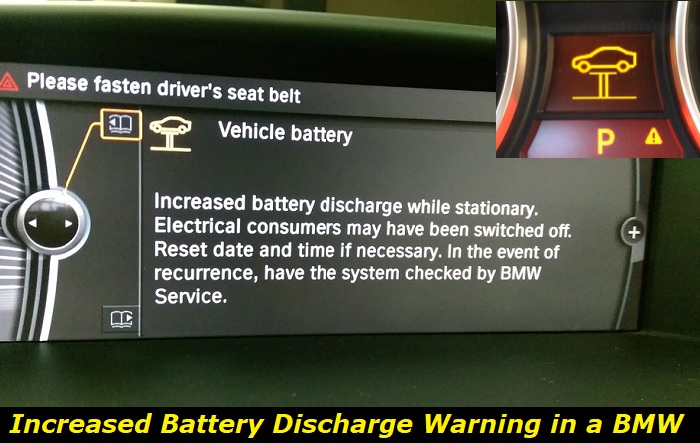Messages on our dashboard often put us in panic mode. But they alert us of any issues affecting our cars' systems, engines, or other components. An example of a dash warning frequent among BMW cars is the "Increased Battery Discharge" warning.
So, what does the "Increased Battery Discharge" dashboard warning in a BMW car mean? Does it mean the battery is low? Does it need charging? What causes the error? Well, let's find out. Today's guide will cover the "Increased Battery Discharge" warning in BMWs.

Increased Battery Discharge in a BMW
"Increased Battery Discharge" in a BMW occurs when the battery voltage is extremely low. It causes your automobile to drain the battery faster than it can recharge. It means your BWM's battery power falls below the healthy level.
The battery discharge may occur even when the car is not in operation. In this case, your BWM consumes more energy than the energy your alternator produces to recharge the battery. Hence, the consumption makes the battery discharge faster than it should.
The quick battery discharge can lead to several issues like:
- Difficulty in starting the engine
- Complications with the electrical components
- Shortened battery life.
The "Increased Battery Discharge" dashboard warning is frequent during winter. Your BMW uses many accessories to power and keeps you warm during the winter.
Reasons For the "Increased Battery Discharge" Warning on Your Dashboard
A BMW's battery might discharge more quickly due to a bad alternator, a problematic battery, or damaged electrical accessories. Your driving habits, like frequent short trips, can also contribute to the discharge error in a BMW. Here is a detailed discussion of why the "Increased Battery Discharge" appeared on your dashboard.
1) A Bad Alternator
The alternator generates the power your BMW uses to operate the car's electrical components. It also restores the battery's charge. Therefore, your battery may have low power if the alternator is not operable. A damaged alternator cannot generate a sufficient voltage to charge the battery. Therefore, your battery will lose charge rapidly when you have a malfunctioning alternator.
You may also notice issues like flickering lights, a growling engine, frequent stalling, trouble starting your car, or trouble with other electrical components.
Factors like wear and tear, heat exposure, overuse, or damage to some part of the alternator can cause a malfunctioning alternator. You'll need to assess whether the alternator is causing the increased discharge. You can start by performing a simple voltage test on your battery. Use a multimeter. A healthy battery should display a 13.5 to about 14-volt reading on your multimeter. Any figure below 12.6 volts is an indication of a malfunctioning alternator.
You may have to change your alternator if the voltage drops below 12.6 volts. Changing your alternator is a relatively straightforward process. You can do it by yourself or let a professional mechanic handle it.
2) A Problematic Battery
Although people categorize BMW as an elite car, it's common for BMWs to suffer high battery drain because of weak batteries. Your battery will weaken as it ages. Its capacity to store electricity reduces. Therefore, it may cause a quicker battery discharge. Essentially, chemical reactions in the battery that produce electricity become less effective as time passes. Thus, preventing it from storing enough energy you'll need to power your car.
Apart from age, self-discharge also contributes to reduced battery capacity. Self-discharge occurs when the battery gradually loses charge when it's not in use. Age also increases self-discharge occurrence. The internal resistance will go up. Hence, causing it to discharge when or when not in use.
Environmental conditions like temperature, humidity, and exposure to extreme hotness or coldness can also cause an accelerated discharge rate in aging batteries. High temperatures cause internal resistance to increase. In turn, it aaa y faster rate of discharge. Likewise, high humidity can cause corrosion within the battery. It will affect its performance and cause an increased discharge rate.
Check the battery voltage with a multimeter to determine if the battery is the cause of the increased battery discharge. Get a new battery if you see a reading lower than 12.6 volts. Generally, it's crucial to check the health of your battery regularly. You may have to replace it to ensure optimal functioning.
3) Damaged Electrical Component
The power draining from the battery may be due to electrical parts in your car. Components like the headlamps, power windows, air conditioning system, et cetera, draw power from the battery. They also use electrical power when the engine is off.
The components may take more electrical current than necessary. Power draining may happen if the electrical parts have some form of damage or improper installation. Short circuits can also cause the battery to empty quickly.
Here are some of the sources of electrical leaks in your BMW:
- An excessive power drain from accessories, such as an aftermarket stereo or GPS device. The device continues to draw power even when the vehicle is off.
- A power seat or window motor that is not shutting.
- Heated seats.
- The AC.
- Phone chargers.
You will need to perform a series of tests using a multimeter to determine if an electrical component is the cause of the "Increased Battery Discharge" error. Perform the test on different spots within the car's electric circuitry system to locate electrical elements using more energy than necessary. Change or fix the components that may be causing the power drain.
It's a complicated process. Let a certified mechanic perform the testing and fixing.
4) Parasitic Drain
Parasitic drain, also known as ghost current or standby current, refers to the small amount of electrical current that flows through a vehicle's electrical system even when it's off. Electrical components like the radio, clock, alarms, or other accessories may cause parasitic draining. The draining will consume power even when the engine is not running.
You may have a discharged battery if the parasitic drain on a battery is too high. It may cause your battery to drain completely. Therefore, it is essential to pinpoint the source of the parasitic drain to prevent unwanted battery drains.
One way to decrease the parasitic drain is to detach the battery from the car when you plan to leave it parking for an extended period. Alternatively, you can have a certified BMW technician inspect the electric system and mend any components consuming excessive energy from the battery.
In some cases, upgrading to a high-capacity battery or installing a battery disconnect switch can also help to mitigate the parasitic drain. However, consider these options after you've tried other measures. Consults a qualified BMW technician to determine the best course of action.
5) Defective Junction Box
A junction box, sometimes referred to as a central electrical unit, contains a variety of electrical systems, like fuses and relays. The electrical systems work as the primary sources of distribution for electrical energy. Therefore, you may see an "Increased Battery Discharge" warning on your dashboard if you have a malfunctioned junction box.
A malfunctioned junction box can lead to battery depletion, resulting in a quick battery drain.
Here are some causes of a defective junction box:
- Water damage - Exposure to water cause corrosion on the electrical connections. The corroded components may eventually break, leading to a power leak or draining. The leaks may trigger the "Increased Battery Discharge" error on the dashboard.
- Short circuit - A short circuit within the junction box can cause a continuous drain on the battery even when the vehicle is off.
- Wiring issues - The wires within the junction box can become frayed or damaged as your car ages. The damaged wires will cause increased resistance and decreased efficiency, resulting in increased battery discharge.
It's vital to have a qualified mechanic inspect your junction box if you suspect it is causing "Increased Battery Discharge" in your BMW. Driving with a defective junction box can lead to more serious electrical problems and potentially dangerous situations.
Other Causes
Along with the mentioned factors, other multiple factors can cause your car's battery to discharge faster than usual. The causes are related to the car's charging system, wiring, less charge on the battery, Faulty IBS (Intelligent Battery Sensor), and using aftermarket elements that don't match your car's electrical system.
The cold weather can also trigger the "Increased Battery Discharge" error. Many drivers make frequent short trips during cold weather. The short trips deny your battery enough time to recharge. Therefore, the electrical components in your car will rely on the limited charge resulting in increased discharging.
A qualified mechanic can help you pinpoint all the factors that may trigger the "Increased Battery Discharge" on your dashboard.
A Wrap
"Increased Battery Discharge" in BMW vehicles occurs because of the reason discussed above. We've seen a bad alternator, battery issues, damaged electrical component issues, and other factors like cold weather that may trigger the error on your dashboard.
It is crucial to have the vehicle inspected by a professional mechanic to determine the cause and take the necessary steps to address the issue if you are experiencing an "Increased Battery Discharge" in your BMW. Proper maintenance and regular battery and electrical system checks can help prevent increased battery discharge in the future.
About the authors
The CarAraC research team is composed of seasoned auto mechanics and automotive industry professionals, including individuals with advanced degrees and certifications in their field. Our team members boast prestigious credentials, reflecting their extensive knowledge and skills. These qualifications include: IMI: Institute of the Motor Industry, ASE-Certified Master Automobile Technicians; Coventry University, Graduate of MA in Automotive Journalism; Politecnico di Torino, Italy, MS Automotive Engineering; Ss. Cyril and Methodius University in Skopje, Mechanical University in Skopje; TOC Automotive College; DHA Suffa University, Department of Mechanical Engineering






Add comment